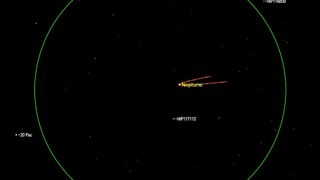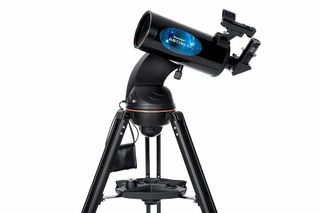Planet Neptune will go into reverse as it moves in the sky on Tuesday
Neptune will continue its retrograde motion until December 3.

Early Tuesday (June 28) Neptune will enter retrograde whereby the planet's eastward movement across the night sky stops and its westward movement begins.
After Tuesday, Neptune "will commence a westward retrograde loop that will last until early December," writes geophysicist Chris Vaughan, amateur astronomer with SkySafari Software who oversees Space.com's Night Sky calendar.
Skywatchers will be able to observe Neptune's faint blue disk in telescopes (marked by a green circle in the image above) according to Vaughan. Look to the southeastern sky between about 2 and 4 a.m. local time to catch a glimpse of the gas giant.
Related: The brightest planets in June's night sky: How to see them (and when)
The exact time of the event varies depending on your specific location, so you'll want to check out a skywatching app like SkySafari or software like Starry Night to check for times. Our picks for the best stargazing apps may help you with your planning.
The apparent "backward" movement of planets across the sky, known as retrograde, is caused by Earth's own orbit around the sun and how our perspective changes during Earth's yearly trip through space.

Looking for a telescope for the next stargazing event? We recommend the Celestron Astro Fi 102 as the top pick in our best beginner's telescope guide.
"Retrograde loops occur when Earth, on a faster orbit closer to the sun, passes more distant planets 'on the inside track'," writes Vaughan. "Making them appear to move backwards across the stars".
Get the Space.com Newsletter
Breaking space news, the latest updates on rocket launches, skywatching events and more!
The further from the sun, the longer the planet spends in retrograde motion accordion to skywatching website In-The-Sky.org. Neptune's retrograde motion will end on December 3, 2022.
If you're looking for a telescope or binoculars to observe the planets, our guides for the best binoculars deals and the best telescope deals now can help. Our best cameras for astrophotography and best lenses for astrophotography can also help you prepare to capture the next skywatching sight on your own.
Follow us on Twitter @Spacedotcom and on Facebook.
Join our Space Forums to keep talking space on the latest missions, night sky and more! And if you have a news tip, correction or comment, let us know at: community@space.com.

Daisy Dobrijevic joined Space.com in February 2022 having previously worked for our sister publication All About Space magazine as a staff writer. Before joining us, Daisy completed an editorial internship with the BBC Sky at Night Magazine and worked at the National Space Centre in Leicester, U.K., where she enjoyed communicating space science to the public. In 2021, Daisy completed a PhD in plant physiology and also holds a Master's in Environmental Science, she is currently based in Nottingham, U.K. Daisy is passionate about all things space, with a penchant for solar activity and space weather. She has a strong interest in astrotourism and loves nothing more than a good northern lights chase!
